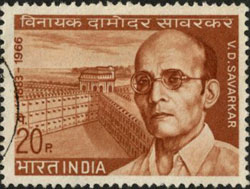|
Faces of India Veer Sawarkar
| |||||
The day was 8 July 1910. An Indian political prisoner was being transported from England to India, by a ship: the S S Morea. This was done at the request of the Governor of Bombay Province who wanted to try him for "sedition". The prisoner was the firebrand barrister, Vinayak Damodar Sawarkar, later to become known universally as Swantryaveer Sawarkar, or Veer Sawarkar, in short. He was a deeply committed and fearless fighter for Indian independence. The British government of the time was wary of him. Elaborate security precautions were taken to prevent his escape from the ship. He was under 24 hour surveillance throughout the journey. Even when he went to the toilet he was watched through strategically placed set of mirrors. As was usual in those days, the ship S S Morea docked at the port of Marseille before continuing its journey to India. |
Faces of India • Shabana Azmi • Amitabh Bachchan • Mahatma Gandhi • Atul Dodiya • Quasim Wani
Passage to India
| ||||
 On the morning of 8 July 1910, Veer Sawarkar expressed his need to use the toilet. He was allowed, under the watchful eye of the guards. But while in the toilet, Veer Sawarkar saw an open porthole. He put his gown on the keyhole so that the policeman could not see inside. Savarkar managed to jump from the porthole and started swimming towards the French shore. Exactly how he did it is unknown, but he knew fully well that if he could step on French soil and surrender to the French authorities, the British would be powerless to recapture him, as France was a sovereign nation. He had committed no offence, political or otherwise, in France.
On the morning of 8 July 1910, Veer Sawarkar expressed his need to use the toilet. He was allowed, under the watchful eye of the guards. But while in the toilet, Veer Sawarkar saw an open porthole. He put his gown on the keyhole so that the policeman could not see inside. Savarkar managed to jump from the porthole and started swimming towards the French shore. Exactly how he did it is unknown, but he knew fully well that if he could step on French soil and surrender to the French authorities, the British would be powerless to recapture him, as France was a sovereign nation. He had committed no offence, political or otherwise, in France.
The British guards had already noticed him jumping from the ship and were in hot pursuit. Despite all their efforts to nab him, Veer Sawarkar swam up to the quay wall of Marseille. Dog tired from the efforts of the swim, he climbed up the wall with super human effort. It was not an ordinary wall, but a particularly tall wall at the shore front. Nevertheless, Veer Sawarkar managed to climb it and was finally on French soil. Now it was merely a question of finding a French policeman on the quayside to approach and claim political asylum. But even in those days, the dictum that "when you need a policeman, there is never one about" rang true. So an exhausted Veer Sawarkar, was running away from the dockside. Of course, the British guards were on his tail, knowing that if he were to surrender to the French authorities and seek political asylum, they would be powerless to nab him. Veer Sawarkar was wearing his prison uniform and had no money. If he had money, perhaps he would have been able to jump on one of the trams that ran along the quayside and thus put some distance between himself and the pursuing British guards. However, he finally managed to locate someone from the local police force and surrendered himself, asking for political asylum. However, the policeman did not speak English, nor did Veer Sawarkar know French. In the mean time, the British guards caught up with Veer Sawarkar and the French policeman. They recaptured him by the simplest of means. They bribed the French policeman! Veer Sawarkar was taken back to the S S Morea. However, Savarkar's friends who were approaching the port to help him sought the help of French socialists who raised a hue and cry in Savarkar's favour. As Veer Sawarkar was captured on French soil, without sanction from French authorities, it was argued that his arrest was illegal and he should be handed back to France. France was afraid of the rising military power of Germany and had, in 1904, made a treaty of friendship with England (Entente Cordial). But the French public were not sympathetic to the cause of the British. In the melee of political contradictions, France demanded the return of Savarkar to them. Britain refused and the matter was taken up at the International Court of Justice at The Hague. Though the Court did not rule in favour of Savarkar, it caused quite a stir in Europe for a year. This incident was referred to in major international treaties at the time and continued to be a source of political tension for British. In Mumbai, or Bombay, as it was known at the time, Veer Sawarkar was sentenced to Transportation for Life, twice, to be served in succession - a total of 50 years! It was a sentence unparalleled in the history of the British Empire. In addition, all his personal property including his spectacles, was confiscated. We went to Marseilles to commemorate the centenary of the heroic escape attempt by this brave freedom fighter. There were apparently 3 separate groups of some 200 people who converged at Marseille to pay tribute to this valiant son of India. And through it, recall the hard-won Independence struggle of India. And also pay homage to their home country.
Related articles:
A biography of Veer Savarkar Who was Veer Savarkar A website dedicated to Veer Savarkar
|
|||||
Editor: Romola Butalia (c) India Travelogue. All rights reserved. |
|||||